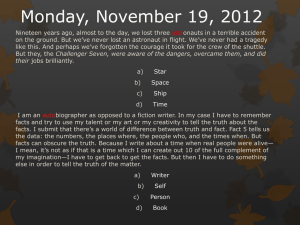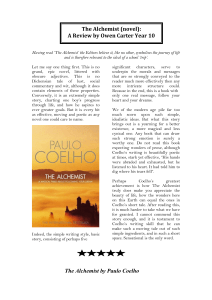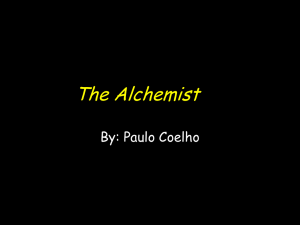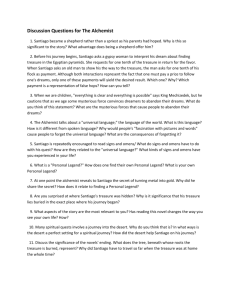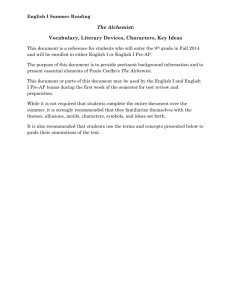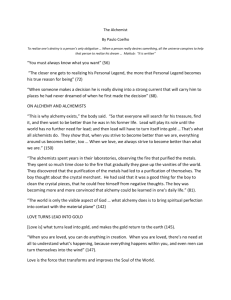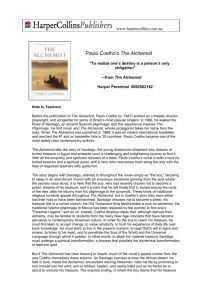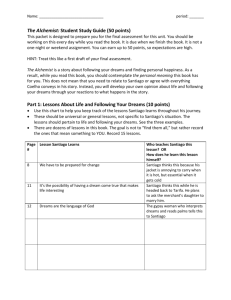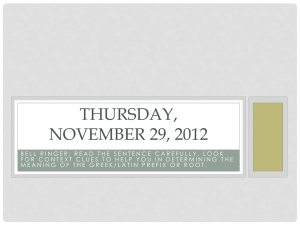Life Realized through Riddles: A Study of Paulo
advertisement
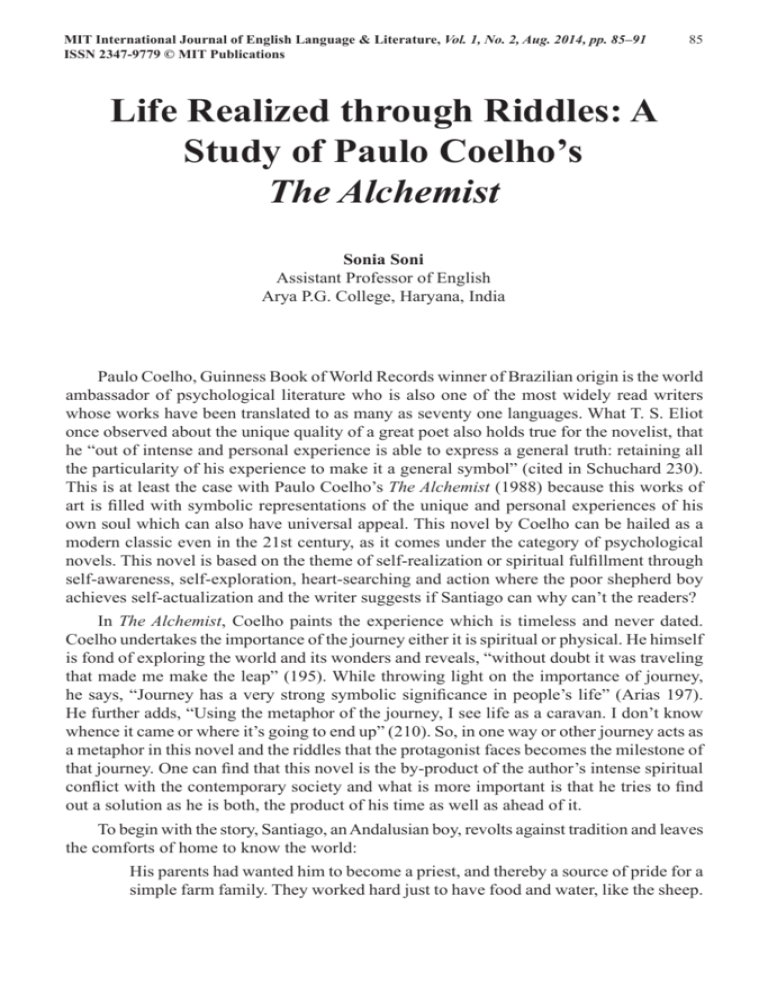
MIT International Journal of English Language & Literature, Vol. 1, No. 2, Aug. 2014, pp. 85–91 ISSN 2347-9779 © MIT Publications 85 Life Realized through Riddles: A Study of Paulo Coelho’s The Alchemist Sonia Soni Assistant Professor of English Arya P.G. College, Haryana, India Paulo Coelho, Guinness Book of World Records winner of Brazilian origin is the world ambassador of psychological literature who is also one of the most widely read writers whose works have been translated to as many as seventy one languages. What T. S. Eliot once observed about the unique quality of a great poet also holds true for the novelist, that he “out of intense and personal experience is able to express a general truth: retaining all the particularity of his experience to make it a general symbol” (cited in Schuchard 230). This is at least the case with Paulo Coelho’s The Alchemist (1988) because this works of art is filled with symbolic representations of the unique and personal experiences of his own soul which can also have universal appeal. This novel by Coelho can be hailed as a modern classic even in the 21st century, as it comes under the category of psychological novels. This novel is based on the theme of self-realization or spiritual fulfillment through self-awareness, self-exploration, heart-searching and action where the poor shepherd boy achieves self-actualization and the writer suggests if Santiago can why can’t the readers? In The Alchemist, Coelho paints the experience which is timeless and never dated. Coelho undertakes the importance of the journey either it is spiritual or physical. He himself is fond of exploring the world and its wonders and reveals, “without doubt it was traveling that made me make the leap” (195). While throwing light on the importance of journey, he says, “Journey has a very strong symbolic significance in people’s life” (Arias 197). He further adds, “Using the metaphor of the journey, I see life as a caravan. I don’t know whence it came or where it’s going to end up” (210). So, in one way or other journey acts as a metaphor in this novel and the riddles that the protagonist faces becomes the milestone of that journey. One can find that this novel is the by-product of the author’s intense spiritual conflict with the contemporary society and what is more important is that he tries to find out a solution as he is both, the product of his time as well as ahead of it. To begin with the story, Santiago, an Andalusian boy, revolts against tradition and leaves the comforts of home to know the world: His parents had wanted him to become a priest, and thereby a source of pride for a simple farm family. They worked hard just to have food and water, like the sheep. MIT International Journal of English Language & Literature, Vol. 1, No. 2, Aug. 2014, pp. 85–91 ISSN 2347-9779 © MIT Publications 86 He had studied Latin, Spanish, and theology. But ever since he had been a child, he had wanted to know the world, and this was much more important to him than knowing God and learning about man’s sins. (Coelho 06) Though living a normal life, Santiago is not content with mere existence, for he tends to believe that the purpose of life is to live a purposeful life. And this quest is aroused by a dream that visits him recurrently wherein a child invites him to the pyramids of Egypt in search of a hidden treasure. Santiago decides to undertake the journey and in the journey he encounters several hostile situations and benign forces, experiences love, becomes an alchemist himself, and eventually discovers the hidden treasure and achieves selfhood. His immersion in the soul of the World or the collective unconscious makes him understand the nature of life and the value of love. Though the father of Santiago tries to stop him but he pays no heed. This craving of Santiago has a similar trace with the craving of the protagonist of The Cyclist when he says, “A world traveller is like an arrow shot, never meant to stop. Pa, I’ll keep on moving ahead, march forward, ahead . . . not looking back. There is no turning back” (Tendulkar 33). Likewise, Santiago too feels that once he has decided to set for his journey there is no turning back. Deliberately, Coelho has put Santiago at the centre or as a subject and he preaches how to live life and how one can alter one’s life by altering his attitudes. The novelist has propounded that it is the radical inner transformation, much like in alchemy, which is an inexorable condition to achieve selfhood. N. V. Banerjee remarks in this regard: The real reason why we can associate representations with one another in our mind, if it is, of course, granted that there are such things as representations, is that qualities or events in the objective or extra-mental world, corresponding to our representation, exist in relations of coexistence and sequence. (Banerjee 66) In order to unfold the secrets of the heart and the soul, Paulo Coelho suggests many ways and with the help of these secrets Santiago achieves his dreams. Coelho says that these basic principles are- listening to the heart, after that following the omens of the world, comprehending the interconnecting nature of the things in this world is one of the most vital features, and at last realising the value of those omens to follow the personal legend is the ultimate thing. Coelho has made tremendous use of abstract and concrete symbols which represent various disciplines like History, Geography, Theology, Philosophy, Psychology, and Mythology to establish these four basic principles. While Santiago is himself the biggest psychological symbol, some of the major symbols are the Moorish eyes of the Andalusian girl and Egyptian pyramids (History); Andalusia, Africa, hill, Sahara desert, sand dunes, and Al-Fayoum oasis (Geography); Santiago’s life, elemental force, universal language, Soul of the World, paradise, battle and alchemy (Philosophy); Melchizedek (Theology); Santiago (Psychology); Santiago’s father and the leader of the refugees from the tribal war (Mythology). Almost all novels of Paulo Coelho reflect the theme of spiritual quest. This consciousness of the Self can be seen in The Zahir, where the writer-protagonist goes in the search of his missing wife. The Pilgrimage also describes the quest of the hero in the search of his hidden sword. They too have to undergo so much sufferings and pain like Santiago in The Alchemist. Time and again, the novelist highlights the thing that Santiago’s life in Andalusia MIT International Journal of English Language & Literature, Vol. 1, No. 2, Aug. 2014, pp. 85–91 ISSN 2347-9779 © MIT Publications 87 as a shepherd is a peaceful and easygoing one. He has enough time to read books and there is no complexity in his life but destiny and King of Salem encourage him to follow his dreams. Though, he was a bit reluctant in the beginning but at last he makes up his mind and decides to take the challenge. Thus “the Ulysses-like journey of exploration and self-discovery for a symbolic search for treasure becomes Santiago’s mission on earth, which is nothing but to find God, implying happiness, fulfilment and the ultimate purpose of creation” (Mishra 167). When Santiago decides to travel all the distance to Egypt, he is not fully convinced but, King of Salem induces this thing in his mind that having a dream makes life interesting and one must find out one’s personal legend and then follow it to its logical end - its realization. He tells Santiago: It’s what you have always wanted to accomplish. Everyone, when they are young, knows what their Personal Legend is. At that point in their lives, everything is clear and everything is possible. They are not afraid to dream and to yearn for everything they would like to see happen to them in their lives. To realize one’s Personal Legend is a person’s only real obligation. (Coelho 15) Through the character of King of Salem, Coelho wants to say that when one is young, one knows what one’s personal legend is and this knowledge makes us work with enthusiasm and develop the guts to accomplish something. In youth, one finds the quest to realise his dream intuitionally. He also adds that common sense is enough to understand one’s personal legend; however, common sense is not very common. According to Coelho, after recognizing one’s personal legend, one need to be aware of his strengths, weaknesses, opportunities and threats. Further, Coelho recognizes four obstacles in the path of the realisation of dreams. With the story of Santiago, the novelist suggests that the first obstacle in realizing one’s personal legend is negativity, which comes from the pressures from the society like parents, teachers, friend, their traditions and expectations. It is continuously told to us that one’s dream is not possible and it can’t be achieved. In Coelho’s words: First, we are told from childhood onwards that everything we want to do is impossible. We grow up with this idea, and as the years accumulate, so too the layers of prejudice, fear and guilt. There comes a time when our personal calling [legend] is so deeply buried in our soul as to be invisible. But it’s still there (08). Coelho adds that if one follows one’s dream with courage of conviction, then the second obstacle in the realisation of dream is love. The follower of the legend fears that he or she may hurt the loved ones. Coelho makes it very clear through the love story of Santiago and his beloved Fatima, as Santiago feels bound to Fatima and her love in the middle of their journey and once decides to leave his dream and Fatima feels that her love is proving an obstacle in the realisation of Santiago’s love. At last, both decide to sacrifice their personal self in order to achieve their inner ‘Self’. Coelho himself focuses this feeling of love in a very vivid manner. Observes Coelho: We know what we want to do, but we are afraid of hurting those around us by abandoning everything in order to pursue our dream. We do not realize that love is just a further impetus, not something that will prevent us going forward, and those who genuinely wish us well want us to be happy and are prepared to accompany us on that journey. (Coelho 08) MIT International Journal of English Language & Literature, Vol. 1, No. 2, Aug. 2014, pp. 85–91 ISSN 2347-9779 © MIT Publications 88 Paulo Coelho adds that after accepting love as a stimulus in the journey, the third obstacle that visits the traveller is the fear of failure, and Santiago is the living embodiment of that. A person encounters a number of difficulties on the way and it appears that he may not succeed. Though, he may be tempted to give up his dream in face of the “insurmountable” hardships as he may stumble several times but should not quit. To this Coelho says the secret of success is to be unperturbed by the fall and get up once again. This is the secret of the success. But, if somebody overcomes the third obstacle the fourth obstacle that hinders the journey is the guilt of success. This happens when one is too close to realizing one’s dream or one’s personal legend. Coelho beautifully explains this phenomenon: Having disinterred our dream, having used the power of love to nurture it and spent many years living with the scars, we suddenly notice that what we always wanted is there, waiting for us, perhaps the very next day. Then comes the fourth obstacle: the fear of realizing the dream for which we have been fighting all our lives (09). Coelho with the help of Melchizedek, the old king of Salem, assures Santiago as well as the readers that “when you want something, all the universe conspires in helping you to achieve it” (20). This statement becomes the soul of the novel as well as the journey of Santiago. Melchizedek is of the view that ‘Everything is written in the Soul of the World’. What matters is to know how to read the omens, which would reveal the secret of everything. He states, “In order to find the treasure, you will have to follow the omens. God has prepared a path for everyone to follow. You just have to read the omens that he left you” (20). The fact is that an omen is a phenomenon which is believed to foretell the future. Omens are actually neither good nor bad, they are a sort of symbols which indicate what would happen in future but all the same one could manipulate the outcomes by preventive action or modify the very nature of things. Coelho is of the opinion that the ability to read the omens can help one in one’s journey for the dream both intuition and experience are required for this as they will help to interpret the things and make the journey easy. According to the old man, “Intuition is really a sudden immersion of the soul into the universal current of life” (21). Santiago confesses, “He had to choose between thinking of himself as the poor victim of a thief and as an adventurer in the quest of his treasure”. (44) The subtitle of the novel A Fable Following Your Dream, The Alchemist explains how omens, which generates from the Soul of the World, can guide us in the pursuit of our dream. After listening to the voice of the omens Santiago with the help of crystal merchant himself becomes a crystal merchant and acquires a grand success. With the incident of crystal shop Coelho wants to say that the individual has power to alter, shape, and improve their life. On the other hand, he believes that character is destiny and our unconscious is as powerful as our conscious in shaping our personality. He also reflects that all things and beings in the universe are connected. An excerpt from The Alchemist reads: The boy was beginning to understand that intuition is really a sudden immersion of the soul into the universal current of life, where the histories of all people are connected, and we are able to know everything, because it’s all written there. The celebration of this connection is manifested in love, again a meta-narrative that Coelho champions the cause of in an otherwise disconsolate, postmodern world. Love is the magic that impels one to be successful. (48) MIT International Journal of English Language & Literature, Vol. 1, No. 2, Aug. 2014, pp. 85–91 ISSN 2347-9779 © MIT Publications 89 If we read the novel, The Alchemist, we find that there are striking similarities in the story of Hermann Hesse’s Siddhartha and Coelho’s The Alchemist as both these novels are highly symbolic and deal with the protagonists’ efforts of self-realization. Hesse remarks, “I have borrowed the theme of this novel heavily from Indian life and philosophy, particularly from Hinduism and Buddhism and targets the Western readers so, I write from a broader perspective, keeping both the East and the West in mind” (Hesse 04). We can also find a different kind of similarity between the novel, The Serpent and the Rope by Raja Rao and The Alchemist. The protagonist of the novel, Ramaswamy, wanders all over the world in search of his spiritual self and asks a question to himself, “life is a pilgrimage I know, but a pilgrimage to where and of what ?” (Rao 28). But, at last he finds this Self in India near his Guru. But, since both the writers belong to different culture, so surely there will be a difference in their attitude for Raja Rao’s is typical Indian and Vedantic while Coelho’s is of universal appeal. As of Paulo Coelho, it can be safely said that he relies on alchemy, the science of transmutation and the art of personal transformation. The values he champions are Christian as well as universal. All these novelists deal with the spiritual problems of the modern man; they conclude that all the problems need spiritual treatment and self-realisation. These novels deal with the theme of love also. The difference is that Siddhartha feels his love for Kamala as an obstacle in the realization of truth, Ramaswamy feels himself bound up with the love of Madeleine while Santiago makes his love of Fatima his power. Fatima also encourages him to achieve his dreams though she is aware of the danger and says, The desert takes our men from us, they don’t always return. Those who don’t return, become a part of the clouds, a part of the animals that hide in the ravines and of the water that comes from the earth. They become part of everything . . . they become the soul of the world. (Coelho102-103) But it is Fatima’s devotion to her love and to Santiago that she bids him farewell. The novelist has beautifully painted the powerful impact of love and believes that love is the magic that impels one to be successful. He highlights: “When we love, we always strive to become better than we are. When we strive to become better than we are, everything around us becomes better too” (100). Coelho has painted the importance of the feeling of love even in the conversation of Santiago and the alchemist. On the way, Santiago urges the alchemist to teach him alchemy, the art of transmutation. The alchemist tells him that it comprises simple truth that everything in the world had a soul and they would evolve till they became perfect. He further tells him to listen to his heart. The conversation between the boy and his mentor highlights this thing: “Why do we have to listen to our hearts?” the boy asked, when they had made camp that day. “Because, wherever your heart is, that is where you’ll find your treasure.” “But my heart is agitated,” the boy said. “It has its dreams, it gets emotional, and it’s become passionate over a woman of the desert. It asks things of me, and it keeps me from sleeping many nights, when I’m thinking about her.” “Well, that’s good. Your heart is alive. Keep listening to what it has to say” (84) The alchemist also tells Santiago’s secret to calm his heart when he complains that he finds it difficult, “My heart is afraid that it will have to suffer,” and Santiago tells to the MIT International Journal of English Language & Literature, Vol. 1, No. 2, Aug. 2014, pp. 85–91 ISSN 2347-9779 © MIT Publications 90 alchemist one night as they looked up at the moonless sky, “Tell your heart that the fear of suffering is worse than the suffering itself. And that no heart has ever suffered when it goes in search of its dreams, because every second of the search is a second’s encounter with God and with eternity” (85). Before taking leave from Santiago, the alchemist initiates him with yet another secret: What you still need to know is this: before a dream is realized, the Soul of the World tests everything that was learned along the way. It does this not because it is evil, but so that we can, in addition to realizing our dreams, master the lessons we’ve learned as we’ve moved toward that dream. That’s the point at which most people give up. It’s the point at which, as we say in the language of the desert, one, and dies of thirst just when the palm trees have appeared on the horizon. (87) Coelho employs Melchizedek as a symbol to represent the ‘Great Spanish Inquisition’. He holds the symbol of both priest and warrior. He makes Santiago realise that when one attains self-realisation, the individual soul is identified with the Brahman and the world is realised as an illusion. While describing the nature of the soul of the world, Melchizedek says that “All things are one” (23). This means that all individual souls are part of the soul of the world. The Egyptian pyramid is another historical symbol used in the novel to declare that human beings can create wonders in this world. Ancient Egyptians collectively generated their personal legend by building pyramids almost two thousand years before, which still stands as a monument of their collective personal legend. At the end of the novel, Santiago reaches the place of his dreams and feels stunted. In order to show the contrast between one who chases the dreams and win it and one who leaves it thinking it impossible. Coelho has deliberately portrayed the character of the leader of the refugees from the tribal war as a person who has missed an opportunity to attain his treasure. In his dream he clearly sees the exact location of the treasure. But his ‘self-love’ makes him reluctant to take up any endeavour to achieve it because his heart does not want him to suffer in his pursuit of the treasure. That’s why he says to Santiago that, “I’m not so stupid as to cross an entire desert just because of a recurrent dream” (172). But, Santiago has the strong and deep desire to follow his dream. He is willing to accept the pain involved in achieving the treasure and attains the treasure at the end. He knows that one should listen to one’s heart, “Remember that wherever your heart is, there you will find your treasure” (111). At the end, Santiago becomes a self-actualized person and thus, alchemy determines the theme and the structure of the narrative of The Alchemist. Coelho’s The Alchemist has been hailed as a book that has transformed the lives of millions of people for the better. In fact, it is more a self-help book than a novel. In it, Coelho has focused on the art of living- how to make life interesting by following one’s dream. He asserts that one has to discover one’s personal legend or the very purpose of being. The courage of Santiago opens all the door of his innerself. Coelho confesses in The Pilgrimage, “Even if I were not able to find my sword, the pilgrimage along the Road to Santiago was going to help me to find myself” (Coelho 14). With the help of the art of alchemy that has the capability to change even cheap lead in to precious gold likewise all human beings are capable of self-realisation if they are ready to suffer and bear pain. Coelho believes that paying heed to one’s unconscious, which manifests itself in forms like dreams, myths, omens and symbols, is also very necessary and one should undertake the journey of life with love MIT International Journal of English Language & Literature, Vol. 1, No. 2, Aug. 2014, pp. 85–91 ISSN 2347-9779 © MIT Publications 91 and care because nobody knows when something good can happen to somebody. It is also true that one has to pay the price for one’s dream and the novelist lays emphasis on taking decisions that one should not be deterred by various formidable obstacles that come one’s way but, every great success demands great sacrifices and great toil. Coelho also claims that the greatest secret of success in life is love, for it is at the root of personal transformation and collective evolution. The lessons of life that The Alchemist teaches are many - life is boredom without having a dream, it requires a lot of courage and strength of character to pursue one’s dream in the face of odds and temptations, the importance of listening to one’s heart, the significance of reading the omens and learning through doing, taking decision and remaining accountable for it, solving problems with fortitude, and most importantly, realizing the enormous power of love. The fruit of the journey lies not in its destination but the journey itself. Life is itself a riddle but it gives several clues and chances to unfold its riddle. What is needed from our side is to have the spark and spirit that can boost our instinct to realise those clues. Coelho proposes these principles and establishes his vision of life that when a person really wants something, the entire world will help him to achieve it. What is needed is a bit of courage, a will to take adventure and lots of love. In short, The Alchemist is a masterpiece of life management through natural or supernatural indications but with unconquerable human spirit. WORKS CITED Arias, Juan. Paulo Coelho: Confession of a Pilgrim. Trans. Ann McLean. London: Harper Collins, 2001. Print. Banerjee, N.V. Kant’s Philosophy of The Self. New Delhi: Arnold- Heinemann Publishers, 1974. Print. Coelho, Paulo. The Alchemist: A Magical Fable about Following Your Dream. Trans. Margaret. York: Harper Collins, 1998. . . . The Pilgrimage. Trans. Alan Clark. New Delhi: Harper Collins, 2004. Hesse, Hermann. Introduction. Siddhartha: An Indian Tale. New Delhi: Indialog Publications, 2005. Mishra, Jyoti. Paulo Coelho’s Fiction Existential and Spiritual Preoccupation: Select Study of Seven Novels. Germany: LAP LAMBERT Academic Publication, 2012. Print. Rao, Raja. The Serpent and the Rope. New Delhi: Orient Paperback, 1968. Schuchard, Ronald. Eliot’s Dark Angel: Intersections of Life and Art. New York: Oxford University Press, 1999. Tendulkar, Vijay. Two Plays by Vijay Tendulkar. New Delhi: Oxford University Press, 2004.
